Shot Behind ISIS Lines: One Year Later, Khofran Tells Her Story
3 June 2018
Mosul, Iraq
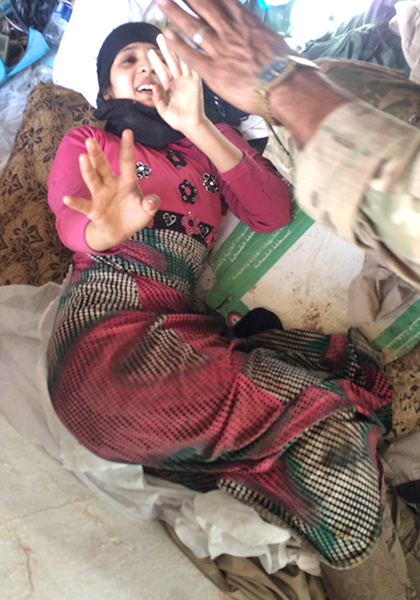
In June 2017, we reported on the rescues of seven Iraqi civilians from ISIS killing fields in Mosul. The rescues occurred near the Mustafsha al Musil Al Ammor (West Mosul) Hospital and a soft drink factory, adjacent to the destroyed Alshohada Bridge over the Tigris, all under ISIS control. As military leaders tried to figure out how to oust the barricaded fighters without killing civilians, families trying to flee past this hospital were being gunned down by ISIS. By the time it was over, more than 150 people had been killed here. On June 2nd and 3rd, FBR teams helped to rescue seven people from this killing field.
On June 2, with the support of a US-military-fired smoke screen, our team ran behind the cover of an Iraqi Army tank and rescued a little girl and a wounded man from this massacre. We thought these were the only survivors, but the next day an Iraqi private named Zuhair came to us: A phone call had come from the other side, he said. A woman was wounded and hiding 50 meters from where the previous rescue had occurred. Zuhair repeated to us the woman’s pleas: “There are more of us. Please help us.”
Zuhair was determined to go, so we prayed together and decided to try. This time we had no armored or air support. But, with God’s help, our team of four Rangers and four Iraqi soldiers, led by Zuhair and guided by an Iraqi civilian named Omar, infiltrated the buildings and rescued the last five survivors.
Three of the survivors had been shot four days before, one was an unwounded small girl and one was a boy who had been wounded earlier and could not walk. All had been hiding among the dead. After getting them out, we prayed for them, evacuated them to the Iraqi Army Casualty Collection Point, thanked God and went back to the battle. We didn’t know if we would ever see any of them again.
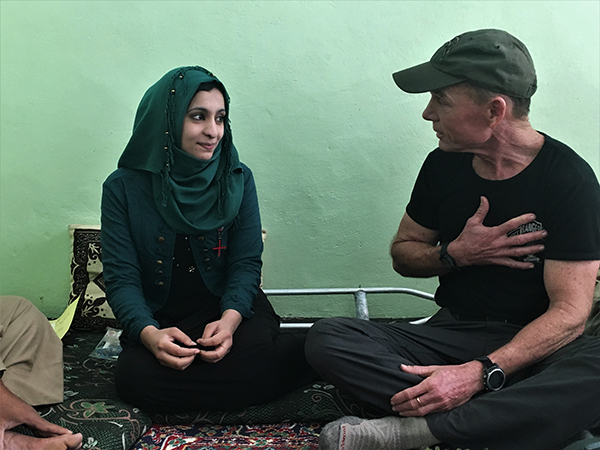
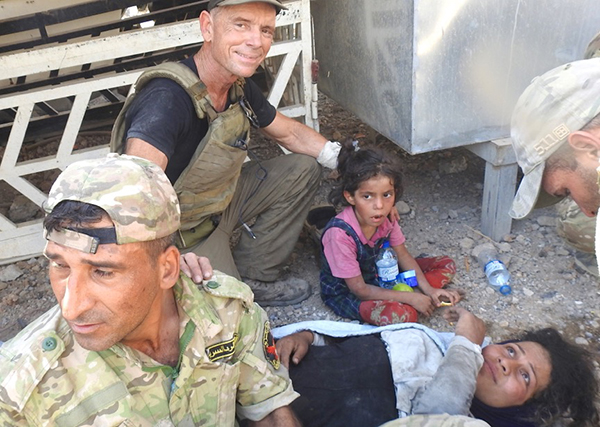
But in November our team located Khofran and her family and we were able to see one another again. By then she had healed enough to walk using just one crutch. It was a joyful reunion and she and Dave each shared their sides of the rescue story, while her family added the details they could. She spoke calmly, clearly, with articulate hand gestures; she seemed infused with a special spirit of peace.
Here, we want to share her story as she told it to us.
Khofran’s home is 20km south of Mosul, up a steep, narrow street with a few houses nearby, rolling brown hills behind and the Tigris River in the distance to the east. As ISIS retreated north in the early part of the Mosul offensive, they picked up civilians along the way to use as human shields. Khofran’s family was caught in this trap and relocated into the Old City of Mosul. In May 2017, as civilians ran out of food and water and ISIS began killing their own families, hundreds of people began to flee.
Around May 30, 2017, the house Khofran and her family had been relocated to was surrounded by the battle – the sound of airstrikes, mortars, rockets and IEDs was all around. There was fear and desperation in this pocket of Mosul, as it was slowly surrounded by coalition forces and filled with retreating, desperate ISIS soldiers girding themselves for their last stand.
When the family ran out of food and water they decided to run. They were in ISIS territory and knew they could be killed accidentally by the forces attacking ISIS – or they could be killed by ISIS. They weren’t the only ones fleeing and the street was full of panicked people. Khofran said the crush of the crowd pushed them forward, so they had no choice but to go. She was with her mother, aunt, sister and brother, and they carried a small baby.
It was hot, and smoke and dust hung in the air. The sound of shooting and explosions was constant, and the destruction in the street made their route an obstacle course. And then the snipers and machine-guns started. People around them started to drop, some wounded, and some killed instantly. Bodies became another obstacle to move around. There was nowhere safer to go and they kept moving.
They were in the courtyard of the soft drink factory, close to the Iraqi lines and safety. Suddenly, Khofran was hit: two bullets tore through her upper leg and she went down. She knew her leg was broken and she could not walk. Her mother took the baby Khofran had been carrying and continued on. Her sister stayed with her for a bit, then left, then came back. But she could not carry Khofran, and Khofran could not walk. People continued to move by them, braving the ISIS fire to get to safety. Her sister left again, promising to come back with help.
Khofran was alone. From where she lay, she could see through the gate of the courtyard, looking out toward the street and beyond to where the Iraqi Army was. But ISIS was behind her and on both sides. As she looked through the gate she could see people dying. One old man had been shot in his wheelchair – still upright, he sagged lifelessly in sight of safety.
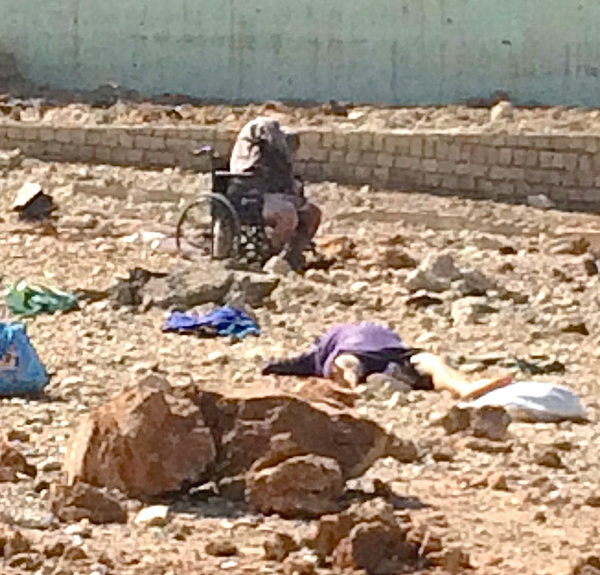
Khofran felt exposed lying in the open courtyard and dragged herself into a small room near the courtyard entrance. Now no one could see her unless they came into the room. She felt safer from ISIS, but what if her sister came back with help? Could they find her? She still had her mobile on her but the battery was dead. She pulled the battery out and banged it on the ground to pound some charge back in, put it back in the phone and called her brother. “Where are you?” she asked. “Come and get me.”
He said he would try. He went to the army for help, to find out the best way to go back, but they wouldn’t allow him. He asked and asked. “My sister is stuck over there,” he said. The army thought it was a suicide mission. ISIS machine guns and anti-tank rockets had already destroyed several vehicles attempting to cross the road to the factory.
Time passed; it became quieter where Khofran was. No new people were attempting to flee from that point. She was surrounded by the silence of the dead – except for a little girl. There was a young girl, dressed in pink, who had somehow survived. It seemed there was also a woman, outside the courtyard, who was wounded and couldn’t move, or she didn’t dare to. Khofran could hear the woman talking to the girl.
Khofran spent more than a day like this. Her phone battery had died. The hours wore on and she felt forgotten and abandoned. Then, in the afternoon of the third day, she heard a new noise – a tank, shouting, and heavy fire were not far from her. There were people besides ISIS nearby. Maybe they were coming for her! But it soon died out and the heavy silence returned.
Still – there had been people out there and in desperation, she called to the girl. “Please, try to find a phone. There are many dead people. Take one of their phones and bring it to me. I will call for help.” The little girl said she would, but only if Khofran gave her some money. She had some and gave it to the girl, who scurried around and brought back several different mobiles.
Khofran found one she could use and called her family again. This time they had her talk to a soldier. He said he would come help her but needed to know where she was. She didn’t know exactly and said she was in a small room near the factory. He said he needed to know more than that. She said she didn’t know. He yelled at her, frustrated. How could he come get her if he didn’t know where she was? She became angry too. “Fine. Don’t come,” she said.
The soldier talked to her brother, who pointed out the wheelchair in front of the courtyard. ”There!” he said. “See that? She is close to there.”
That same day another man came by. She hadn’t seen anyone living, besides the girl, for three days. Here was another small hope. She didn’t know if her family would come, or the Iraqi soldier. “Help me,” she asked. “I’ll pay you money.” He said he had to help his mother first but would come back with help. Then he left.
Once again she was alone. She could see the day come and go from the light in the little concrete room. She could hear the regular sounds of war, the concussions of explosions, the pops of bullets. Sometimes, when it was quieter, she could hear the voices of ISIS coming from somewhere nearby. She was afraid. She could not move, and she had had nothing to eat or drink for three days. The light of the new day was her fourth since she had been shot.
Hours passed. All of her phones were dead now. She again heard ISIS and felt sure it was a matter of time before they found her. She would not escape.
When a man came through the door of the little room she raised her hands instinctively to her face, to protect it from whatever blow might be coming. But it was a white man, an American – and then came the Iraqi soldier, telling her not to be afraid. They were going to help.
And so she lived. She, along with two others who had been shot and trapped, the teenage boy, and the little girl, were carried out by the team, climbing over the rubble of the destroyed factory, silently, praying the ISIS militants on the other side of the wall wouldn’t hear them.
Pain from her broken femur knifed through her with every jostle. When they got to the wall they would have to lift her over to exit the factory, they told her to put her scarf in her mouth and not make any noise. She stayed quiet, all the way to the Humvee. And then, as they handed her into the vehicle, pain and relief coursed through her body and she screamed. She was alive.
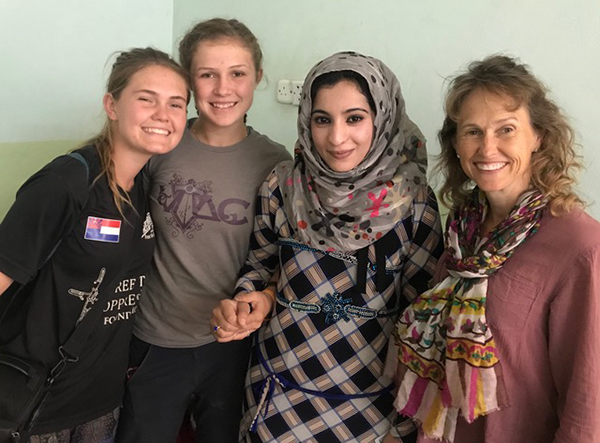
In November, when we were reunited in her home in liberated Mosul, she told Dave, “My family left me, but you, an American came to save me. Thank you and I thank God.”
Dave replied, “I thank God for His help and for the brave Iraqis who led us to you, for our team and all who prayed for us. We did not do this alone. Jesus was with us and Jesus loves you.”
We saw her again in late May, almost exactly one year after her rescue. She no longer needed a crutch but still had a significant limp. When we asked what she needed and if we could help her, she replied, “You saved my life. It is enough. I thought I was a dead person and you gave me new life.” Khofran is now waiting for another surgery and we are praying for that and the help she will need.
We were also able to reunite with Omar, the man she had asked for help who later guided the team to her, and with Private Zuhair, who led the rescue. Omar is now living with his family in Mosul and Zuhair is still working for the Iraqi federal police. We thank God for their lives and their friendship.
